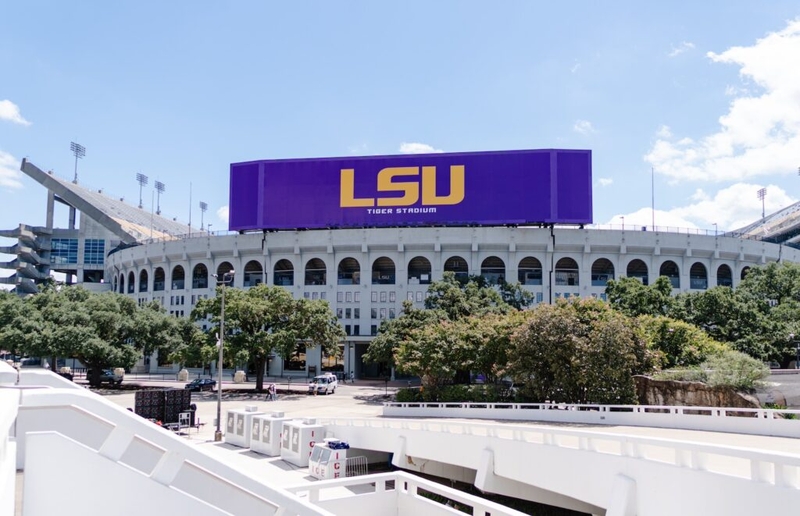
Tiger Stadium at Louisiana State University pictured on Sept. 13, 2024. (Matthew Perschall for Louisiana Illuminator)
WASHINGTON — A measure that would set a national framework for college athletes’ compensation got one step closer to becoming law Wednesday after advancing in two separate U.S. House panels.
The bill’s fate remains uncertain as it makes its way through Congress, and Democrats argue that the legislation would give “unchecked authority” to the NCAA on athletes’ pay and fails to provide labor and employment protections for athletes.
Two panels with jurisdiction over the matter — the House Energy and Commerce and Education and Workforce committees — approved the legislation, known as the Student Compensation and Opportunity through Rights and Endorsements Act, or ‘‘SCORE Act.”
The Energy and Commerce Committee’s vote fell along party lines, 30-23.
On the Education and Workforce panel, the 18-17 vote featured all Republicans who were present voting in favor of the measure except Rep. Michael Baumgartner of Washington state. All Democrats on that panel voted against the measure. GOP Reps. Kevin Kiley of California and Elise Stefanik of New York did not vote.
Rep. Tim Walberg, chair of the House Committee on Education and Workforce, said the bill “brings much needed stability to college athletics.”
“Since the NCAA lifted Name, Image and Likeness and transfer rules in 2021, college athletics have been in a period of chaos as constant litigation and efforts to classify student-athletes as employees jeopardize thousands of academic and athletic opportunities,” the Michigan Republican said during his committee’s consideration of the bill.
Kentucky GOP Rep. Brett Guthrie, chair of the House Energy and Commerce Committee, said during his panel’s markup that “without this bill, student-athletes will be left to fend for themselves against bad actors, non-revenue generating sports could face devastating cuts and legal uncertainty will continue to hang over all of college sports.”
The full House will not consider the legislation until at least September, when members return from their summer recess that began one day ahead of schedule Wednesday.
A federal standard
The effort, nominally bipartisan, comes as the college sports world grapples with the fallout from the NCAA’s 2021 guidelines that let student-athletes profit from their name, image and likeness, or NIL. A patchwork of laws exists across states, and there is currently no federal NIL law.
A federal judge in June approved the terms of a nearly $2.8 billion antitrust settlement that paved the way for schools to directly pay athletes.
The bill would prohibit college athletes from being recognized as employees and would require colleges to “provide comprehensive academic support and career counseling services to student athletes that include life skills development programs,” such as those regarding mental health, nutrition, strength and conditioning and financial literacy.
The bill’s lead sponsors are GOP Rep. Gus Bilirakis of Florida and Democratic Reps. Janelle Bynum of Oregon and Shomari Figures of Alabama.
Guthrie, Walberg and GOP Reps. Jim Jordan of Ohio, Lisa McClain of Michigan, Scott Fitzgerald of Wisconsin and Russell Fry of South Carolina were also original co-sponsors.
‘Extreme employment ban’
Rep. Bobby Scott, ranking member of the House Committee on Education and Workforce, said that “instead of holding the revenue-rich NCAA and its powerful conferences accountable, the SCORE Act provides a series of blank checks and bailouts that will not uplift or protect college athletes,” during the panel’s markup.
The Virginia Democrat said the bill “imposes obligations without oversight, fails to include concrete protections and outright bans college athletes from ever having labor or employment protections.”
“This extreme employment ban will not only open the door for further exploitation of college athletes and protect athletic departments’ bottom lines more than the students they serve, it is a broad stripping of athletes’ rights, and that should not be the solution,” he said.
Rep. Frank Pallone, a New Jersey Democrat and ranking member of the House Energy and Commerce Committee, voiced similar concerns during his committee’s markup.
The measure “fails to offer meaningful protections to college athletes and completely ignores the true crisis facing colleges and universities,” he said, adding that President Donald Trump “continues to destroy America’s higher education system with reduced federal research dollars, taxes on endowments and cuts to federal student aid.”
Pallone also said the bill “gives the NCAA and conferences nearly limitless and unchecked authority to govern how athletes get paid, if they can transfer schools, and how much time they can be required to spend training, traveling and competing.”


